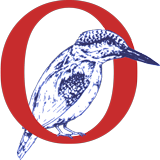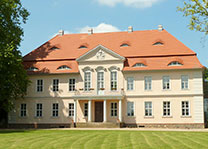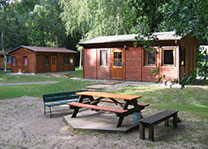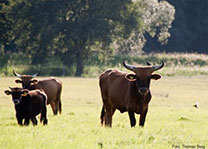National park before the settlement
The amendment — that means weakening — of the National Park Act contradicts Brandenburg, German and international requirements and framework conditions
In the coalition agreement signed by the Brandenburg Prime Minister and SPD state party chairman Platzeck, there is little to be read under the heading of nature conservation, only that the National Park Act is to be amended, i.e. weakened. It is noteworthy that this law was drawn up almost exactly 10 years ago by the then still green Environment Minister Platzeck and passed by the state parliament with a large majority. The responsible Brandenburg Minister of Agriculture, Woidke, cites three points as reasons for this sudden and radical change of heart:
1. Nature conservation in general and the national park in particular prevent business settlements and the creation of new jobs.
This accusation has never been substantiated, and certainly has never been proven, and it does not apply, at least for the Lower Oder Valley. The opposite is the case. The national park created numerous additional jobs, not only in the national park administration and in the nature watch, but also in non-profit nature conservation and tourism.
2. The national park locks people out and should be made more accessible for tourism.
This analysis is wrong and the demand nonsensical. The network of trails in the national park is extremely dense. In addition, the numerous, large-scale nature parks and biosphere reserves are primarily available for nature tourism in Brandenburg; the national park itself does not even take up 0.3% of the land area. Unlike in a nature park, nature conservation has priority here. But even in the Lower Oder Valley there is still plenty of space for tourist activities, for example in the landscape protection area that surrounds the national park. Not much has happened here in terms of tourism and there is plenty of space for Woidke’s additional activities. Our association has made appropriate suggestions, for example keeping attractive large mammals in spacious exhibition enclosures.
3. The national park is not accepted by the local population.
This accusation is only partially true and preferably applies to some local politicians. It remains to be said that a national park is not a Schwedt city park or a regional park for the Uckermark district, but, as the name suggests, a park for the German nation and we find overwhelming approval for national parks in general and the Lower Oder Valley National Park in particular.
The fact that acceptance in the region, especially among functionaries, can still be improved, is mainly due to the contradicting and less than goal-oriented national park policy of the state government. That started with the appeal of the then Agriculture Minister Zimmermann in 1992 to tear down the barriers set up by his colleague Environment Minister to regulate the road network in the national park. Since then, the state government has never made it clear to the region, and has supported it with appropriate donations, that the national park is an important, irreversible project of the country. Instead of acting in a conciliatory and mediating manner, the responsible state minister has rather incited the various actors against each other. In addition, the acceptance argument, carried forward like a monstrance, is hypocritical. In other state projects that are to be implemented for reasons of the common good, such as at Schönefeld Airport, the massive regional resistance of the local population affected is completely ignored. The objections of those affected are stored at the Federal Administrative Court with evidence of washing baskets. The state government is unimpressed. Obviously, double standards are being used here and it becomes clear that the national park has not yet been a seriously operated project of the state of Brandenburg.
The reasons for an amendment given by the opponents of the national park are therefore not convincing. Nevertheless, the amendment of the National Park Act, especially at the instigation of the regional member of the state parliament, Bischoff, was written into the coalition agreement. What is meant by this is clear, because the coalition factions SPD and CDU already decided on a detailed draft amendment before the election, which is now to be implemented after the election, albeit on a much smaller parliamentary basis. Agriculture Minister Woidke has described the amendment to the National Park Act as urgent. The Association of Friends of the German-Polish European National Park Unteres Odertal e. V. does not consider the National Park Act of 1995 to be a particularly successful law, it is verbose and poor in content, but at that time it was a workable compromise between the most diverse expectations, demands and interests.
This compromise package, which was only successful at the second attempt, should not be untied again. Anyone who wants to amend the National Park Act today wants to dilute and weaken it.
This inevitably leads to considerable conflicts with international, German and Brandenburg nature conservation law. If the National Park Act were to be amended as planned, the only thing left of the National Park would be the title, the label, so to speak. All other content that essentially defines a national park disappeared. The association categorically rejects such a blatant fraudulent label. You have to be honest with people. If it says national park, it has to be a national park! A national park is not something arbitrary, but requires certain quality standards. These are set by the World Conservation Organization in IUCN Category II, in the Federal Nature Conservation Act and in the Brandenburg State Nature Conservation Act.
1. IUCN Category II (National Parks): This is about the protection or restoration of natural ecosystems. At least 75%, previously 50% of the area must be in a state that is not or hardly influenced by humans. The natural processes are protected. Tourists and visitors are welcome.
2. Federal Nature Conservation Act (2002) Section 24 (2): National parks aim to ensure the most undisturbed flow of natural processes in their natural dynamics in the predominant part of an area. As far as the protection purpose allows, national parks should also serve the scientific environmental observation, the natural history education and the nature experience of the population. You must (Section 24 (1) sentence 3) “be in a predominant part of their area in a state not or little influenced by humans or be suitable to develop into a state or to be developed into a state that guarantees the most undisturbed flow of natural processes in their natural dynamics”.
3. Brandenburg Nature Conservation Act (2004) Section 20: When the Nature Conservation Act was amended this year, Section 24 Paragraphs 1 and 2 (National Parks) of the Federal Nature Conservation Act were adopted verbatim.
The draft amendment of the government groups SPD and CDU (January 27, 2004) follows 3 tendencies:
1. There should no longer be any development opportunities towards a natural floodplain ecosystem. Everything that indicates development and change is deleted. The current status quo is to be cemented.
2. The previous users of the area — farmers, fishermen, anglers, hunters, water sports enthusiasts, etc. — should not be restricted in their previous opportunities to pursue their hobby.
3. The powers of the national park administration, although already minimal, will be further curtailed. Agreements on agreement are deleted, the national park administration is only to be involved in all important decisions affecting the national park (rules of conduct). To this end, all important decisions must be agreed with the National Park Board of Trustees in the future. Membership in the Board of Trustees, regulated in Section 14 of the National Park Act, is completely turned on its head. The representatives of the federal ministries and half of the representatives of the nature conservation organizations are kicked out, instead the representatives of the lobbyists’ associations of farmers, foresters, anglers, fishermen and hunters come in. The board of trustees, which has been completely reorganized in this way, is granted a veto right in all national park matters.
In a national park that deserves this name, natural development processes have priority. We call them wilderness areas. They can also be called Zone I areas or total reserves. The National Park Act provides for 50% of the total area to be designated as Zone I areas. The legislature has given 15 years time for this, a sufficient period of time, one would think. There is no point in lengthening this period of time. The problems associated with the designation of Zone I areas will not be easier to solve in 10 or 15 years, but rather even more difficult to solve, even if today’s politicians would no longer be in office and responsible. But such an attitude is short-term interest politics.
In summary, it can be said that there are insufficient reasons for an amendment to the National Park Act. The draft amendment presented by the coalition factions would mean that nothing would be left except the label “National Park”. The status quo would be cemented, change or development would no longer be possible. As the experts at the ministry have clearly shown, the national park is already the weakest in Germany. Is that the typical Brandenburg route? Brandenburg would expose itself to ridicule internationally and nationwide with such a fraudulent label.
The state of Brandenburg is at a crossroads, either to implement a real national park on 0.3% of the state’s area in accordance with the existing national park law, or, if one thinks that it cannot afford a national park, to transform the area into a nature park dedicated to tourism. But then Brandenburg would have to cope with the predominantly negative consequences of such a decision. It would not serve tourism, because there are enough nature parks in Brandenburg. The alleged or actual problems that exist with a national park would not be solved with such a decision. Brandenburg, however, would have embarrassed itself once again with its nature conservation policy across borders and without borders.
There is no zoo without animals, no aquarium without water, no opera without an orchestra and also no national park without wilderness areas — without human intervention on at least half of the area. One has to choose.
Unlike Minister Woidke, we do not see the National Park and the National Park Act as a “block on the leg”, but rather an opportunity for a structurally weak region. We should use this opportunity together








